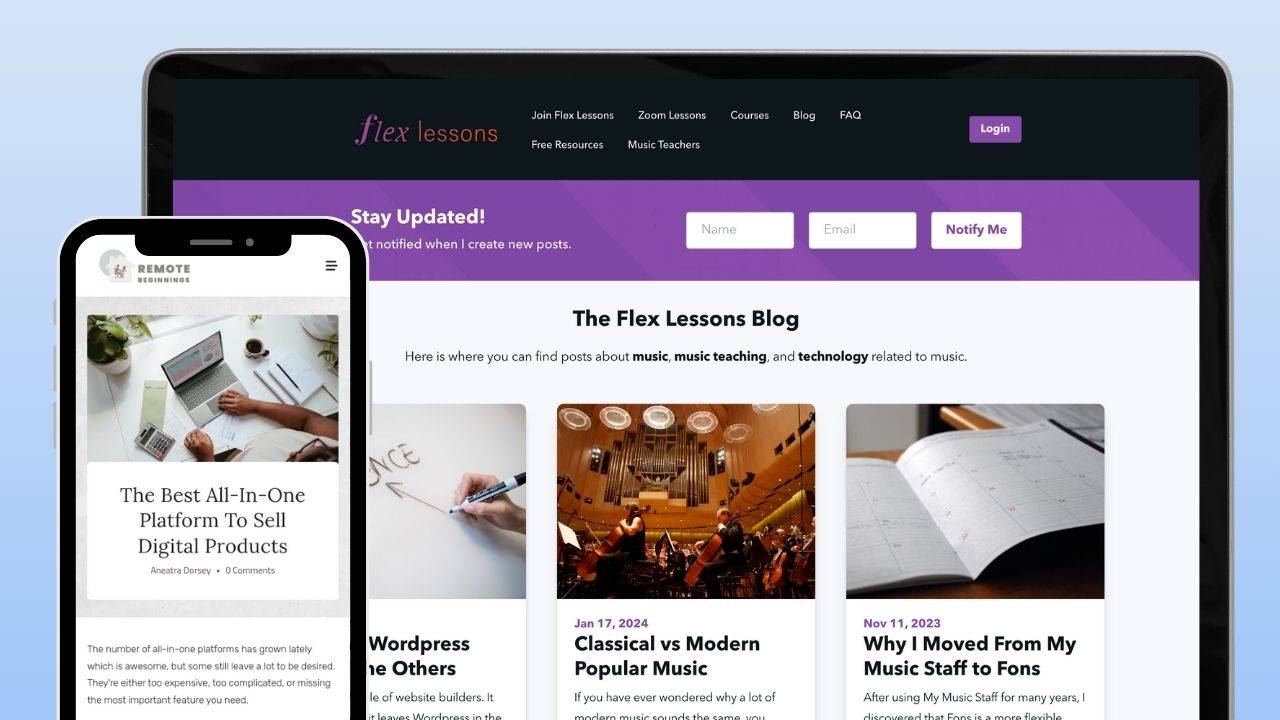
Choosing the Right Platform for Your Online Course
Creating a course is exciting. But choosing where to host it is just as important as building the content.
Your choice affects everything:
- How students experience the course
- How you collect payments
- How easy it is to market and grow
This guide walks you through a full e-learning platforms comparison. You will see what to look for, which options are leading today, and how to pick the right online course hosting for your needs.
Why Platform Choice Matters
Picking the wrong platform can create:
- Payment issues
- Limited design control
- Bad student experiences
- Higher costs later on
Choosing the right digital course platforms saves time, builds trust, and grows your revenue faster.
Key Factors to Consider Before Choosing
Ask yourself these questions before you compare platforms:
- How much control do you want over branding and design?
- Do you want to sell through your own website, or reach a marketplace audience?
- How will you deliver lessons: video, audio, text, or downloads?
- Will you offer live sessions, coaching, or memberships later?
- What is your budget for setup and monthly fees?
Your goals will guide your decision.
Marketplace vs Self-Hosted: Two Main Paths
Marketplace Platforms
Platforms like Udemy or Skillshare give you access to ready-made audiences.
Pros:
- Huge built-in traffic
- Quick setup
- No need to handle payment systems
Cons:
- Lower control over branding and pricing
- Heavier competition
- Revenue sharing with the platform
Best for first-time course creators who want fast exposure.
Self-Hosted Platforms
Self-hosted options like Teachable or Thinkific let you build your own branded course website.
Pros:
- Full control over design and pricing
- Keep more revenue
- Build your email list and customer base
Cons:
- Requires more marketing effort
- Some technical setup needed
Best for those ready to build a brand and grow long-term.
Top Digital Course Platforms for 2025
Here’s a clear e-learning platforms comparison of the best choices today.
1. Teachable
Teachable is one of the most popular online course hosting options.
Strengths:
- Easy drag-and-drop course builder
- Full control over pricing and branding
- Built-in sales pages and checkout systems
- Supports upsells, coupons, and bundles
Best for: Creators who want a simple but powerful start with full ownership.
2. Thinkific

Thinkific offers strong flexibility for growing course businesses.
Strengths:
- No transaction fees on paid plans
- Custom domain connection
- Multiple course formats (video, text, quizzes, downloads)
- Membership site support
Best for: Educators planning to build a library of courses over time.
3. Kajabi
Kajabi combines course hosting, website building, and marketing automation.
Strengths:
- Strong email marketing and CRM tools built-in
- Excellent sales funnel options
- Podcast and membership support
- Professional templates and designs
Best for: Creators building a full digital business — not just selling one course.
4. Podia
Podia is simple, affordable, and great for small teams or solo creators.
Strengths:
- Sell courses, memberships, webinars, and digital downloads
- No extra transaction fees
- Simple storefront builder
- Live chat support included
Best for: Creators wanting an easy, low-cost all-in-one option.
5. LearnWorlds

LearnWorlds focuses on interactive learning experiences.
Strengths:
- Interactive videos with quizzes and buttons
- Built-in certificates and assessments
- Strong student engagement tracking
- White-label branding available
Best for: Courses that require certifications or high engagement.
6. Udemy
Udemy is a marketplace with millions of learners.
Strengths:
- Access to massive traffic
- Easy publishing with no hosting costs
- Great for building authority quickly
Limits:
- Lower course prices controlled by Udemy
- Revenue sharing cuts into profits
- Limited email list building
Best for: Building a starter audience or selling low-priced courses.
What to Look for When Comparing Platforms
Here’s what matters most when doing an e-learning platforms comparison:
Course Creation and Delivery
- How easy is it to upload and organise content?
- Can you mix videos, text, downloads, and quizzes easily?
- Is it mobile-friendly for students on phones or tablets?
Branding and Customisation
- Can you fully customise your site and sales pages?
- Can you use your own domain name?
- Can you remove platform branding?
Payments and Pricing
- Can you set your own prices and offer payment plans?
- How are payments processed (Stripe, PayPal)?
- Are there any hidden transaction fees?
Marketing and Sales Tools
- Does it include email marketing?
- Are there built-in affiliate programme tools?
- Does it support coupons, upsells, and bundles?
Support and Training
- Is there 24/7 support?
- Are there tutorials or a knowledge base?
- Is the platform reliable and trusted?
Subscription Models vs One-Time Payments
Some platforms encourage recurring payments through memberships. Others focus on one-time course sales.
Memberships work best when:
- You offer ongoing content or coaching
- You want to build a strong community
- You want stable monthly income
One-time payments work best when:
- Your course solves a clear, one-time problem
- You want simple upfront revenue
Choose based on your business model and future goals.
Common Mistakes When Choosing a Platform
- Picking the cheapest option without checking features
- Ignoring how much control you lose in a marketplace
- Forgetting to plan marketing outside of platform tools
- Underestimating how important mobile access is
- Switching platforms too often (migration is messy)
Choose carefully upfront to save time, money, and headaches later.
Quick Checklist for Choosing Your Online Course Platform
- Do you want full control over your brand and pricing?
- Do you have a marketing plan to drive your own traffic?
- Will you sell more courses or memberships later?
- Do you need strong email and sales funnel tools?
- Are you planning to issue certificates or run assessments?
- Does the platform offer easy payment handling?
- Can you scale with this platform over the next few years?
Answering these questions makes your decision much easier.
Pick the Platform That Fits Your Future
There is no single “best” online course platform. There is only the best one for your goals, skills, and audience.
Think carefully about where you want your e-learning business to be in 12–24 months. Choose a platform that fits your vision — not just today, but for growth tomorrow.
Smart online course hosting makes your life easier, your students happier, and your business stronger.


